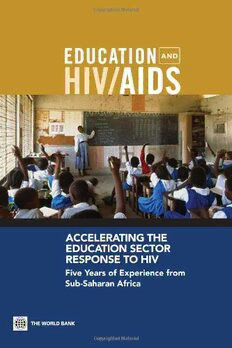
Accelerating the Education Sector Response to HIV: Five Years of Experience from Sub-saharan Africa (Education and Hiv Aids) PDF
132 Pages·0.928 MB·English
Most books are stored in the elastic cloud where traffic is expensive. For this reason, we have a limit on daily download.
Preview Accelerating the Education Sector Response to HIV: Five Years of Experience from Sub-saharan Africa (Education and Hiv Aids)
Description:
This Review was undertaken by the Networks of Ministry of Education HIV&AIDS Focal Point from countries in sub-Saharan Africa participating in the Accelerate Initiative, together with stakeholder and partner representatives. The education sector has become increasingly recognized as playing a key external role in prevention and in reducing stigma, and an important internal role in providing access to care, treatment and support for teachers and staff, a group that in many countries represents more than 60% of the public sector workforce. In 2002, the Joint United Nations Programme on HIV&AIDS (UNAIDS) Inter-Agency Task Team (IATT) on Education established the Accelerate Initiative Working Group to support countries in sub-Saharan Africa as they accelerate their education sector responses to HIV&AIDS through the establishment of programs with strong local ownership, capable of accessing suitable funding and implementation at all levels of the education sector. The Networks of Ministry of Education HIV&AIDS Focal Points, established through the Initiative under the auspices of the Africa Union Regional Economic Communities, have rapidly taken ownership of the Accelerate Initiative. This Review explores the experiences of education sectors across sub-Saharan Africa as they accelerate their response to HIV&AIDS within the Accelerate Initiative. It demonstrates that leadership by Ministries of Education has been crucial in mobilizing activities, and that full participation of all stakeholders is needed for effective implementation. Since 2002: 37 countries have participated; 4 Networks have been established; 1,350 education staff members and 76 development partners have participated in 120 training days; 75% of participating countries are now accessing funds through their National AIDS Committees; 76% have an HIV&AIDS education sector strategy and plan; 91% train teachers to protect themselves; all countries are now implementing HIV prevention education; 74% are training teachers in the life skills approach; and 71% provide free education for orphans and vulnerable children.
See more
The list of books you might like
Most books are stored in the elastic cloud where traffic is expensive. For this reason, we have a limit on daily download.
